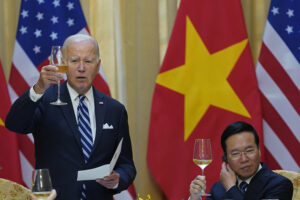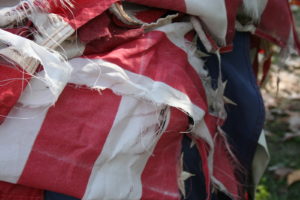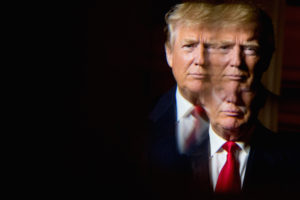Exceptional, You Bet
As I read Vladimir Putin's sanctimonious op-ed article about U.S. policy in Syria, I imagined the Russian president sitting at the keyboard in a lovely pink negligee.As I read Vladimir Putin’s sanctimonious op-ed article about U.S. policy in Syria, I imagined the Russian president sitting at the keyboard in a lovely pink negligee.
You will recall that when a satirical painting of Putin in lingerie went on display last month in St. Petersburg, police seized the offending artwork and shut down the exhibit. The artist, Konstantin Altunin, fled the country and is seeking asylum in France. No doubt he wanted to avoid the fate of the punk rock group Pussy Riot, three of whose members were arrested and sentenced to years in prison for an anti-Putin performance in a Moscow cathedral.
So when Putin tries to lecture “the American people and their political leaders” from a position of moral superiority, no one on earth can take him seriously. And as for Syria, the sinister and barbarous government of dictator Bashar al-Assad would not last one week without the military hardware that Russia generously provides. Putin thus has the blood of tens of thousands of innocent civilians on his hands.
Putin’s piece in The New York Times does raise an interesting question, however: Has President Obama, the patient seeker of multilateral solutions, now embraced the idea of American exceptionalism?
“It is extremely dangerous to encourage people to see themselves as exceptional, whatever the motivation,” Putin wrote. (Once again, I couldn’t avoid that truly exceptional image with the negligee.)
I, too, was struck by this passage at the end of Obama’s speech:
“America is not the world’s policeman. Terrible things happen across the globe, and it is beyond our means to right every wrong. But when, with modest effort and risk, we can stop children from being gassed to death, and thereby make our own children safer over the long run, I believe we should act. That’s what makes America different. That’s what makes us exceptional. With humility, but with resolve, let us never lose sight of that essential truth.”
If this sounds like a big change in Obama’s worldview, you’ve been paying too much attention to the right-wing echo chamber — and not enough to what Obama actually says and does.
It is an article of faith among Obama’s critics that he believes the United States is just a regular country, no better or worse than others, and that, accordingly, he seeks to abdicate any leadership role in the world. Where do these critics get such an idea? From their own fevered imaginations, mostly.
What is supposed to be the smoking-gun quote came in 2009, when Obama, responding to a question during an overseas trip, said the following: “I believe in American exceptionalism, just as I suspect that the Brits believe in British exceptionalism and the Greeks believe in Greek exceptionalism.” Aha, said the critics, he believes we’re just like post-empire Britain and bankrupt Greece.
But if you read the rest of the quote, the president was clearly saying that most people around the world have national pride — but the United States, in his view, is indeed unique.
He spoke of unmatched U.S. economic and military power. He said he was “enormously proud of my country and its role and history in the world.” And he added that “we have a core set of values that are enshrined in our Constitution, in our body of law, in our democratic practices, in our belief in free speech and equality, that, though imperfect, are exceptional.”
Ronald Reagan said it more poetically with “shining city on a hill,” but the idea is the same. Obama has told audiences many times that his life story would not have been possible in any other country. If anyone doubts his willingness to throw American weight around, with or without support from other nations, go ask for opinions in the places where missile-firing U.S. drones circle ominously overhead.
To me, the concept of exceptionalism underpins Obama’s strongest argument for taking military action in Syria. When we see more than 1,400 men, women and children killed with poison gas, it is not our nature to look away. We ask ourselves whether there is anything we should do. We weigh the costs and benefits, the risks and rewards, and we do what we can. The moral case for a strike against the Assad regime is predicated on the fact that if the United States doesn’t do something, nobody will.
Yes, Mr. Putin, you can call that American exceptionalism. I like it a lot better than the Russian kind.
Eugene Robinson’s e-mail address is eugenerobinson(at)washpost.com.
© 2013, Washington Post Writers Group
Your support matters…Independent journalism is under threat and overshadowed by heavily funded mainstream media.
You can help level the playing field. Become a member.
Your tax-deductible contribution keeps us digging beneath the headlines to give you thought-provoking, investigative reporting and analysis that unearths what's really happening- without compromise.
Give today to support our courageous, independent journalists.









You need to be a supporter to comment.
There are currently no responses to this article.
Be the first to respond.